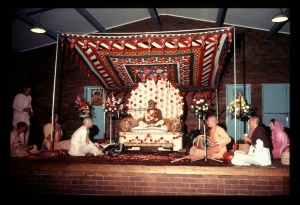CC Madhya 20.344: Difference between revisions
m (1 revision(s)) |
No edit summary |
||
| Line 1: | Line 1: | ||
{{ | [[Category:Sri Caitanya-caritamrta - Madhya-lila Chapter 20|C344]] | ||
<div style="float:left">'''[[Sri Caitanya-caritamrta|Śrī Caitanya-caritāmṛta]] - [[CC Madhya|Madhya-līlā]] - [[CC Madhya 20|Chapter 20: Lord Śrī Caitanya Mahāprabhu Instructs Sanātana Gosvāmī in the Science of the Absolute Truth]]'''</div> | |||
<div style="float:right">[[File:Go-previous.png|link=CC Madhya 20.343|Madhya-līlā 20.343]] '''[[CC Madhya 20.343|Madhya-līlā 20.343]] - [[CC Madhya 20.345|Madhya-līlā 20.345]]''' [[File:Go-next.png|link=CC Madhya 20.345|Madhya-līlā 20.345]]</div> | |||
{{CompareVersions|CC|Madhya 20.344|CC 1975|CC 1996}} | |||
{{RandomImage}} | |||
==== TEXT 344 ==== | ==== TEXT 344 ==== | ||
<div | <div class="verse"> | ||
kaler doṣa-nidhe rājann | :kaler doṣa-nidhe rājann | ||
asti hy eko mahān guṇaḥ | :asti hy eko mahān guṇaḥ | ||
kīrtanād eva kṛṣṇasya | :kīrtanād eva kṛṣṇasya | ||
mukta-bandhaḥ paraṁ vrajet | :mukta-bandhaḥ paraṁ vrajet | ||
</div> | </div> | ||
| Line 14: | Line 18: | ||
==== SYNONYMS ==== | ==== SYNONYMS ==== | ||
<div | <div class="synonyms"> | ||
''kaleḥ''—of the Age of Kali; ''doṣa-nidhe''—in the ocean of faults; ''rājan''—O King; ''asti''—there is; ''hi''—certainly; ''ekaḥ''—one; ''mahān''—very great; ''guṇaḥ''—good quality; ''kīrtanāt''—by chanting; ''eva''—certainly; ''kṛṣṇasya''—of the holy name of Kṛṣṇa; ''mukta-bandhaḥ''—liberated from material bondage; ''param''—to the transcendental, spiritual kingdom; ''vrajet''—one can go. | |||
</div> | </div> | ||
| Line 21: | Line 25: | ||
==== TRANSLATION ==== | ==== TRANSLATION ==== | ||
<div | <div class="translation"> | ||
“‘My dear King, although Kali-yuga is full of faults, there is still one good quality about this age. It is that simply by chanting the Hare Kṛṣṇa mahā-mantra, one can become free from material bondage and be promoted to the transcendental kingdom.’ | “‘My dear King, although Kali-yuga is full of faults, there is still one good quality about this age. It is that simply by chanting the Hare Kṛṣṇa mahā-mantra, one can become free from material bondage and be promoted to the transcendental kingdom.’ | ||
</div> | </div> | ||
| Line 28: | Line 32: | ||
==== PURPORT ==== | ==== PURPORT ==== | ||
<div | <div class="purport"> | ||
As mentioned above, this verse is Śrīmad-Bhāgavatam 12.3.51. | As mentioned above, this verse is [[Srimad-Bhagavatam|''Śrīmad-Bhāgavatam'']] 12.3.51. | ||
</div> | </div> | ||
__NOTOC__ | |||
<div style="float:right; clear:both;">[[File:Go-previous.png|link=CC Madhya 20.343|Madhya-līlā 20.343]] '''[[CC Madhya 20.343|Madhya-līlā 20.343]] - [[CC Madhya 20.345|Madhya-līlā 20.345]]''' [[File:Go-next.png|link=CC Madhya 20.345|Madhya-līlā 20.345]]</div> | |||
__NOTOC__ | |||
__NOEDITSECTION__ | |||
Revision as of 16:27, 7 September 2021
Śrī Caitanya-caritāmṛta - Madhya-līlā - Chapter 20: Lord Śrī Caitanya Mahāprabhu Instructs Sanātana Gosvāmī in the Science of the Absolute Truth

His Divine Grace
A.C. Bhaktivedanta Swami Prabhupada
A.C. Bhaktivedanta Swami Prabhupada
TEXT 344
- kaler doṣa-nidhe rājann
- asti hy eko mahān guṇaḥ
- kīrtanād eva kṛṣṇasya
- mukta-bandhaḥ paraṁ vrajet
SYNONYMS
kaleḥ—of the Age of Kali; doṣa-nidhe—in the ocean of faults; rājan—O King; asti—there is; hi—certainly; ekaḥ—one; mahān—very great; guṇaḥ—good quality; kīrtanāt—by chanting; eva—certainly; kṛṣṇasya—of the holy name of Kṛṣṇa; mukta-bandhaḥ—liberated from material bondage; param—to the transcendental, spiritual kingdom; vrajet—one can go.
TRANSLATION
“‘My dear King, although Kali-yuga is full of faults, there is still one good quality about this age. It is that simply by chanting the Hare Kṛṣṇa mahā-mantra, one can become free from material bondage and be promoted to the transcendental kingdom.’
PURPORT
As mentioned above, this verse is Śrīmad-Bhāgavatam 12.3.51.